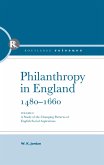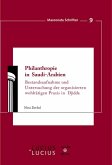Professor Jordan examines the problem of poverty in the early modern world and discusses the various measures taken by the Tudors and Stuarts to deal with the needs of the poor. He concludes that poverty was principally relieved by an immense outpouring of charitable wealth. This wealth flowed principally from an urban aristocracy determined not only to care for the hopelessly destitute but so to enlarge the 'area of opportunity' so that poverty could be prevented. At the same time, the Elizabethan law of charitable uses marshalled this generous wealth into effective agencies. The study closes with a full assessment of the noble achievements of the period: the founding of a widespread and effective system of education, the establishment of almshouses in all parts of England, and extraordinairy adn fertile experiments with the several agencies of social rehabilitation.
The author records in this voluma a great and enduring historical achievement; he records as well the triumph of the secular preoccupations of mankind.
This book was first published in 1959.
Dieser Download kann aus rechtlichen Gründen nur mit Rechnungsadresse in A, B, BG, CY, CZ, D, DK, EW, E, FIN, F, GR, HR, H, IRL, I, LT, L, LR, M, NL, PL, P, R, S, SLO, SK ausgeliefert werden.









